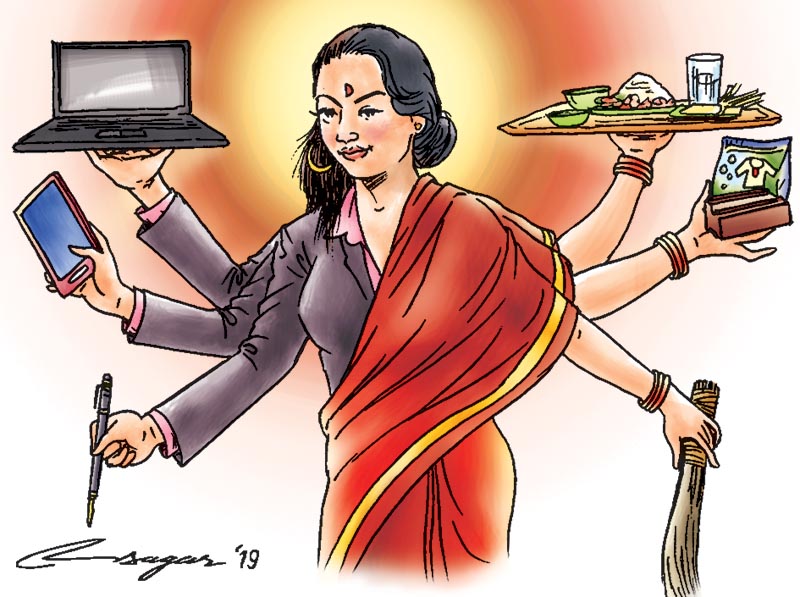Human first: Break stereotype of woman
It is society that creates the demarcation between male and female. Otherwise, a woman is a human being first. She possesses human values more than a woman’s characteristics
Women around the world suffer from violence. Those who believe in feminism see it as a consequence of the patriarchal social structure in which men subordinate women. It is certain that violence against women has existed in every society around the world. Men are understood as the superpower in a male chauvinistic society whereas women are perceived as the “other”. The French feminist and existentialist philosopher, Simone de Beauvoir, is well known for her non-fiction, The Second Sex, published in 1949. Reading her book helped me to understand the value of self-existence of a human being. In The Second Sex, she describes women’s oppression of that time. Reading the book reformed my parochial perception of patriarchy and feminism. Beauvoir begins her book with a very powerful sentence, “One is not born, but rather becomes a woman”.
An important essay of her book, “Woman as Other” gave rise to a long thread of questions as I proceeded further into the text. How is a woman the ‘other’? What is her existence? What is her position in family and society? Has a woman ever looked into her otherness? What deprived her of the “self”? What is that element which doesn’t identify her “self”?
It took almost half a decade to understand her and her philosophy of “self” and “other”. I now understand that it is society that creates the demarcation between male and female. Otherwise, a woman is a human being first. She possesses human values more than a woman’s characteristics. To be kind or cruel, docile or strong, submissive or decisive, shy or confident, introvert or extrovert is human nature, which can’t be changed unless there is an exception.
However, the patriarchal society has already fixed the binary division between male and female. The weak characteristics of a human being are categorised as a woman’s traits. Likewise, making fun of a male’s subtlety and putting pressure on a female to be strong and confident, both are stereotypes. Therefore, it is time to fight against those stereotypes and to establish human traits that respect all natures of human kind.
Reading Beauvoir led me to study Judith Butler, an American philosopher and a gender theorist. I will not hesitate to share with you that I was unaware of “gender” and “sex” things until I read Butler in 2014, and her essay on “gender performativity”. I then got introduced to gender, a socially constructed thing, which has something to do with the performativity of an individual, termed as masculinity and femininity.
Interestingly, it’s wonderful to perceive male and female as a “sex” of a human being, which is a biological identity of a human being. The most interesting was the moment where I encountered a line “A man can act as a feminine, a woman can act as a masculine”, which delivered sacred satisfaction to me. It even punctured my stereotypical knowledge that gender discrimination, which is an innate problem of my society and social structure, is a mere product of the patriarchal social construction.
Reading Butler reformed my perception, renewed my understanding and gave me a new version of myself. The more I got into exploring the gender roles, gender performativity, the more I began to look into myself, question the worth of being me. Acknowledging the idea that ‘there is no gender identity behind the expressions of the gender, that identity is per-formatively constituted by the very expression that are said to be its consequence’, made me question what is my self? Who am I? What am I performing? What is the worth of my performativity?
Crawling through Beauvoir, to find an answer to all the above questions, I proceeded into Butler and then into British philosopher Bertrand Russell in 2016. At one point, Russell says that ‘every powerful emotion has its own myth-making tendency’. This line seems compatible with the patriarchy structure in the Nepali society that has programmed the male and female with different gender roles. Creating a binary demarcation for male and female activities and their social participation has given birth to today’s rage and revenge against humans.
In addition, providing unproductive roles to the female, depriving them of an education and social participation and decision making for long has created conflict in today’s society. Making a female feel as an object of love and care, make her feel secure and protected then have now resulted in conflict and chaos as the female proceeds in the quest of self-existence.
Women in the West had already surpassed this stage of rage and revenge over the patriarchy by the early 20th century. American feminism of the 20th century advocated for the academic and economic prosperity of women so that they could live independently on their own. On the contrary, the lack of realisation of “self existence” in the rest of the world indeed is the key element that prevents a human from moving forward.
Therefore, learning even from the Western experiences, it’s time to pursue our self. The self-existence can be acquired through the way of freedom with responsibility. Similarly, responsibility can be handled only when one becomes a learned individual. Hence, we must fight for equal opportunities for women in education and employment. The unanswered question as to ‘how a woman is made other?’ can be resolved only when every individual (both male and female) go hand in hand.






